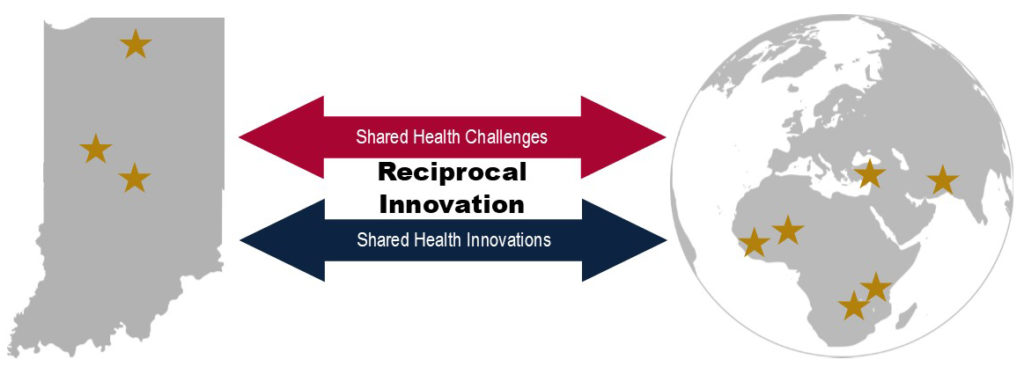
Faculty members and researchers from Indiana University, Purdue University and the University of Notre Dame, and other Indiana health leaders, believe that strategies and solutions developed with partners in low- and middle-income countries hold promise to address not only global health challenges, but local health challenges as well.
New grant opportunities sponsored by the Indiana Clinical and Translational Sciences Institute (CTSI) and the IU Center for Global Health (IUCGH) seek to foster this intentional system of international global health collaboration called reciprocal innovation.
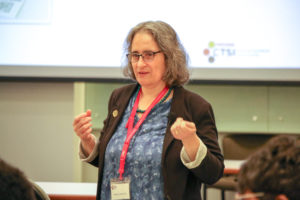
At a recent global health stakeholders’ meeting convened by the Indiana CTSI and IUCGH, state health leaders and stakeholders prioritized the domestic health challenges most likely to benefit from an emphasis on reciprocal innovation. These include: chronic diseases, infant mortality and maternal health, substance use disorders, and access to healthcare.
Reciprocal innovation builds on the concept of reverse innovation which typically refers to healthcare innovations and technologies designed and tested in under-resourced countries around the world and brought back to developed countries to address health challenges. These reverse innovations are attractive because they are often cost-effective; easy to replicate, scale, and sustain; require minimal infrastructure; and can be tailored to local needs.
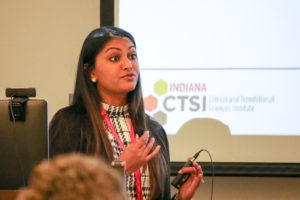
Reciprocal innovation advances this concept to create two-way global health partnerships that engage global health stakeholders in refining and implementing these approaches. Ideally, these partnerships provide mutual benefit to both sides while identifying high quality innovations for demonstration, replication, and dissemination.
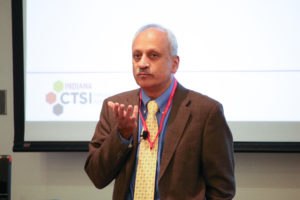
Based on the stakeholder meeting and dozens of conversations with global health leaders, the Indiana CTSI and IU Center for Global Health issued two requests for applications (RFA) for planning and demonstration grants for reciprocal innovation efforts that address the priority health challenges.
The planning grants will award up to $10,000 for one year and the demonstration grants will award $50,000 for two years. The grants are open to researchers at Indiana CTSI partner institutions (IU, Purdue, and Notre Dame) including individuals with full-time faculty appointments, graduate-level trainees, and post-graduate fellows. The project proposal must demonstrate collaboration with partners within Indiana or from low- and middle-income countries. The deadline for the demonstration grants is March 5, 2020 and applications for planning grants will be accepted year-round as funds remain.
“This is a true bringing together of great strength across the three universities and across our long-standing areas of expertise,” said Anantha Shekhar, MD, PhD, founding director of the Indiana CTSI.
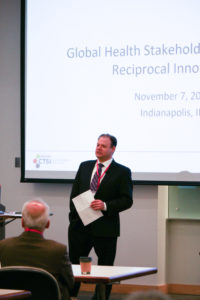
Shekhar said that health disparities exist not only in low- and middle-income countries, but also in Indiana. He said the goal is to recruit more faculty in this area and to offer more training and pilot grants.
“So, it made even more sense for us to say we should have a global-local program for the Indiana CTSI, using this approach, where our partners do great work globally, we learn from these projects and bring them here, and when they do great work locally, we take them to other parts of the world,” said Shekhar,
“The opportunity to learn from our international partnerships and apply those lessons to solve local problems in Indiana and the U.S. is tremendous,” said Thomas G. Sors, PHD, co-director of the Global Health Research Program within the Indiana CTSI. “When you work with partner countries that have limited financial means and poor infrastructure, you have to find ways to solve problems with inexpensive solutions that are simple to implement. These solutions, many times, have direct application in our low income and rural communities.”
Sors is also assistant director of the Purdue Institute of Inflammation, Immunology and Infectious Disease.
“I’m very excited to be talking about reciprocal innovation,” said Kara K. Wools-Kaloustian, MD, director of research for the IU Center for Global Health. “Reciprocal innovation is actually a concept that was born in Indiana and we embrace it strongly here.”
Wools-Kaloustian said that one of the first applications of reciprocal innovation was during the HIV outbreak in Scott County, Indiana, several years ago. The Centers for Disease Control (CDC) sought help to care for patients in the rural Indiana county. The IU School of Medicine’s Division of Infectious Diseases provided the expertise based on experience and success in HIV care and control in rural Kenya through the AMPATH partnership.
Two successful current efforts showcase the variety of ways that reciprocal innovation can impact health for Hoosiers.
Debra Litzelman, MA, MD, MACP, director of education for the IU Center for Global Health, is the principal investigator for the WeCare program to reduce infant mortality in Indiana. The program utilizes three key components derived from Litzelman’s global health work: community health workers, decision support tools and targeted mobile health (mHealth) educational messaging.
“This as an example of reciprocal innovation because I’ve been working in Kenya for 20 years and have seen the models of care that work in any under-served and under-resourced area. Ideas can spark ways to apply it to our own backyard,” said Litzelman.
Early results show a reduction in infant mortality rates in the program areas.
Maria Lieberman, BS, PhD, professor of chemistry at Notre Dame, developed paper analytical device (PAD) technology to more easily identify counterfeit drugs, a significant problem in many low resource settings. To use the PAD technology, a suspect pharmaceutical is spread across a piece of paper and then soaked in water. Different resulting colors indicate different types of pharmaceuticals or other substances such as baking soda. Each test costs fifty cents to manufacture.
“The development of new technologies that are scalable and implementable in low resource settings is a compelling research problem that can impact people’s lives all over the world,” Lieberman said.
The technology has applications in the U.S., not only to identify counterfeit drugs, but also for harm reduction groups, to help first responders identify the source of a drug overdose or help law enforcement identify potentially harmful substances at a crime scene.
The Indiana CTSI and IU Center for Global Health have previously funded 23 global health pilot grants for a total of $420,000 to develop collaborative processes and create a foundation for this type of research exchange.
View demonstration grant webinar here.
View planning grant webinar here.
For more information, please contact Rish O’Brien.
